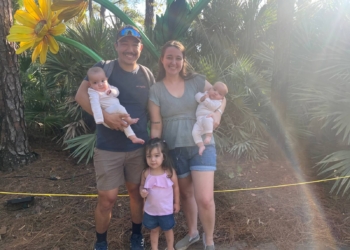Sarah Streyder voted from three overseas locations in 2024 alone.
“We were stationed in Korea during the presidential primary,” said Streyder, a military spouse and founder/executive director of Secure Families Initiative. “We were PCSing — mid-PCS — in the states during the regular state primary. And then we had made it to our next duty stationed in England by the time I cast my general election ballot.”
But a March 25 executive order, “Preserving and Protecting the Integrity of American Elections,” could make that scenario — one many military families experience a variation of — a logistical nightmare or even impossible.
The EO states that the United States “fails to enforce basic and necessary election protections employed by modern, developed nations, as well as those still developing” and, among other directives, calls for an enforcement of citizenship verification for federal elections, prosecution of election crimes and improving voting-system security.
That’s why SFI has joined several organizations to file a lawsuit against the order, which SFI believes “directly threatens the ability of military families to vote absentee — particularly those stationed overseas,” according to a news release.
“It’s a solution in search of a problem,” Streyder told Military Families Magazine. “Because our states and local officials already have robust and secure eligibility and verification processes. And all this order seems to do is to add barriers on the individual that are redundant to what security processes are already in place.”
While the U.S. District Court for the District of Columbia issued an order on April 24 granting a preliminary injunction against the EO’s proof of citizenship element, SFI’s lawsuit will move forward. It was unclear as of publication if the Trump administration would abide by the ruling.
Military-cast ballot rejections
In the 2020 presidential election, voter turnout among service members was 47% compared to 74% for their civilian counterparts, according to the Federal Voting Assistance Program.
Half of that deficit is from people who cast ballots but those ballots “were ultimately not counted,” Streyder said.
“These are folks who want to vote and are going through the steps, but something’s getting in the way,” she said.
A 2022 election administration and voter survey report noted the following reasons for ballot rejections:
- 4% for being received after the state deadline
- 1% for voter signature problems
- 1% for postmark issues
- 18% for “some other issue”
Streyder said this means voting tends to be “harder and less accessible” for service members away from their voting precinct. And “chronic aspects of military life” like PCSing, which typically occurs in the summer months alongside voter registration season, contribute to the issue.
The Uniformed and Overseas Citizens Absentee Voting Act of 1986 (UOCAVA) aimed address “the wide variability” in voting rules and requirements throughout the country that made overseas voting more difficult. In 2009, the Military and Overseas Voter Empowerment (MOVE) Act amended the UOCAVA, requiring overseas voters have the option to receive their absentee ballot electronically and that absentee ballots “be transmitted no less than 45 days before a federal election,” the EAC stated.
Concerns about EO
What became obvious after reading the order — along with other voting-related legislation — is that it doesn’t account for the military community’s “lived experiences,” Streyder said.
“It doesn’t seem to picture that type of voting or the types of barriers we encounter when written and perhaps inadvertently, if I’m to give benefit of the doubt, creates what are at the end of the day, unnecessary barriers to individual, military and overseas voters who are already jumping through hoops to make their vote count,” she said.
Among SFI’s concerns is the elimination of “post-Election Day ballot return deadlines,” noting it’s “never been in question that ballots have to be postmarked by Election Day.”
“This order goes in the opposite direction of what our voters need in order to have as most access as possible,” Streyder said.
The U.S., according to the EO, hasn’t “adequately enforced” election requirements like those that “prohibit states from counting ballots received after Election Day.”
“This is like allowing persons who arrive three days after Election Day, perhaps after a winner has been declared, to vote in person at a former voting precinct, which would be absurd,” the EO stated.
But for SFI, their position is about more than a “single executive order.” The organization sees the military community as experiencing a “broader, longer-standing pattern” of the undermining of trust in and access elections and a patter of military family voices being left out of policy conversations.
“It’s one of the reasons why you’ll see SFI not only stand up for voting rights and equitable voting policies, but we have a military family Bill of Rights this year. And the goal there is this recognition that families deserve baseline protections and dignity,” she said. “And right now, the way that our structures are set up do not always enable that.”
Read comments










































